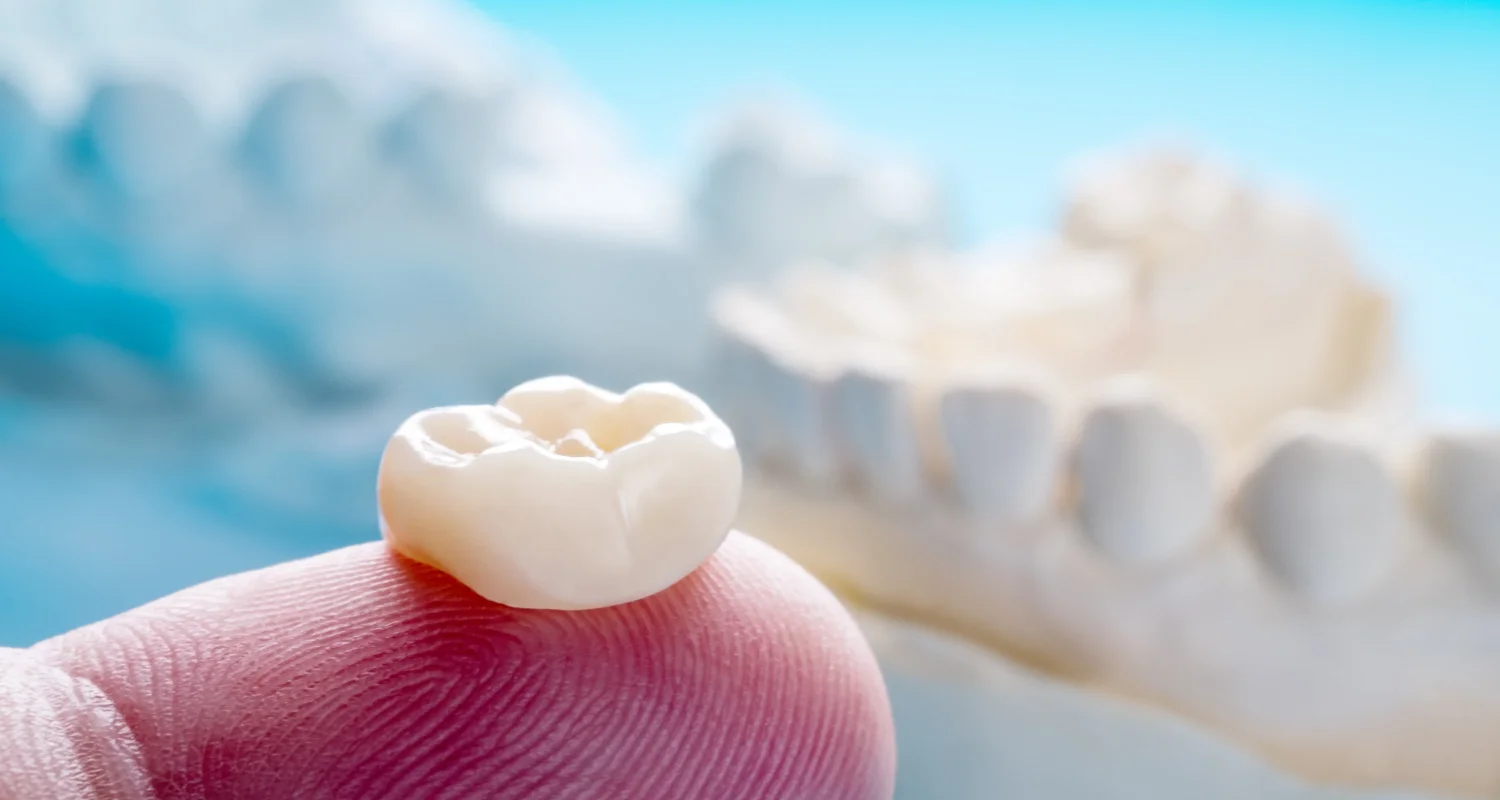Last Updated on: 19th September 2025, 12:35 pm
Teeth glue, also known as dental adhesive, is a great help for people who wear removable dentures, giving them extra stability and confidence when speaking or eating. It can also be a quick fix in emergencies, as when a crown comes loose or a veneer needs a little extra support to stay in place. In some cases, it can even help with minor denture repairs.
There are different types of teeth glue, ranging from over-the-counter options to those that require professional supervision. While these adhesives can be helpful, using them correctly is essential to avoid potential oral health issues. Not all products on the market are suitable for every situation, and improper or excessive use can lead to complications.
In this article, we’ll explore what teeth glue is, how it works, the different types available, the risks involved, and the best ways to use it safely.
What is teeth glue?
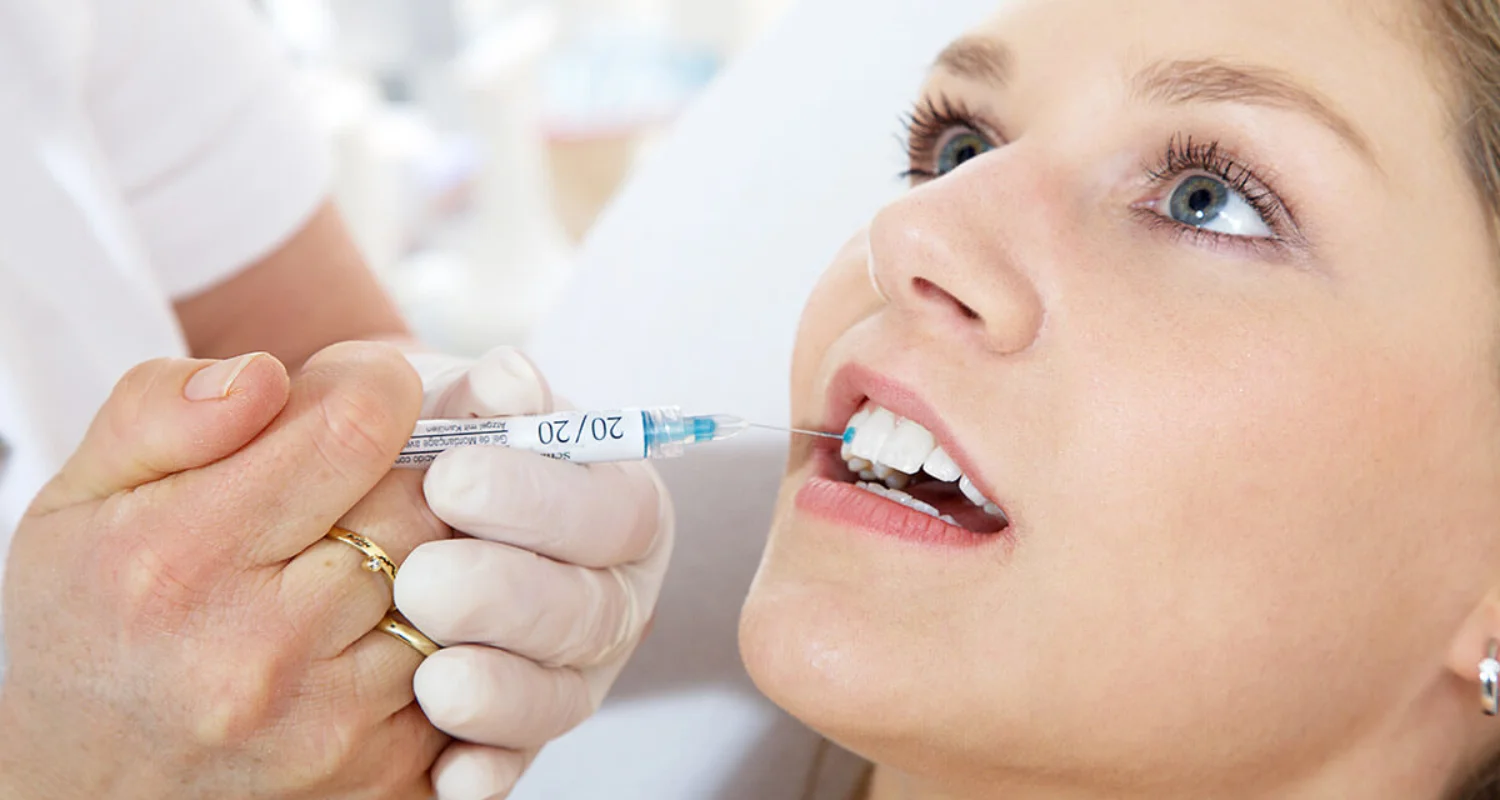
Teeth glue is a specialized material used to secure dentures, crowns, and other dental restorations, either temporarily or permanently. Some types are designed for professional use by dentists, while others are sold over the counter for temporary fixes at home. Choosing the right type is essential for maintaining oral health and preventing complications.
Types of teeth glue
Not all teeth glue is the same. Unlike regular household glue, which is meant for fixing furniture or broken objects, dental adhesives are formulated for safe use in the mouth. Here are the most common types:
1. Denture adhesive (for removable dentures)
This type of adhesive comes in creams or adhesive strips to keep removable dentures stable while eating, speaking, and moving your mouth throughout the day.
How it works: Think of a suction cup sticking to a smooth surface: it works better with a little moisture. Denture adhesive functions similarly, and saliva plays a key role in the process.
When applied to dentures and placed in the mouth, saliva activates the adhesive, forming a soft but strong bond between the denture and the gums. It fills tiny gaps and enhances suction, preventing the dentures from slipping or moving. However, this bond is not permanent and weakens over time due to eating, drinking, and saliva production. For best results, it needs to be reapplied daily.
You can buy Sea Bond by clicking on this link.
2. Temporary crown glue
Used under a dentist’s supervision, this adhesive temporarily holds a crown in place before a permanent replacement can be applied.
How it works: Similar to double-sided tape, this glue fills the space between the tooth and the temporary crown. As it hardens, it expands slightly to create a snug fit. However, it is water-soluble and designed to be easily removed when it comes time for the permanent crown.
Buy your Dentemp Recap-It Dental Repair Kit Here.
3. Permanent crown glue (for fixed crowns and bridges)
This strong dental cement is exclusively used by dentists to attach permanent crowns and bridges securely.
How it works: Imagine super glue for teeth, but safer and stronger. Once applied, it bonds the restoration to the tooth by transitioning from a liquid to a solid state. Some types harden using a special dental light, while others rely on a chemical reaction.
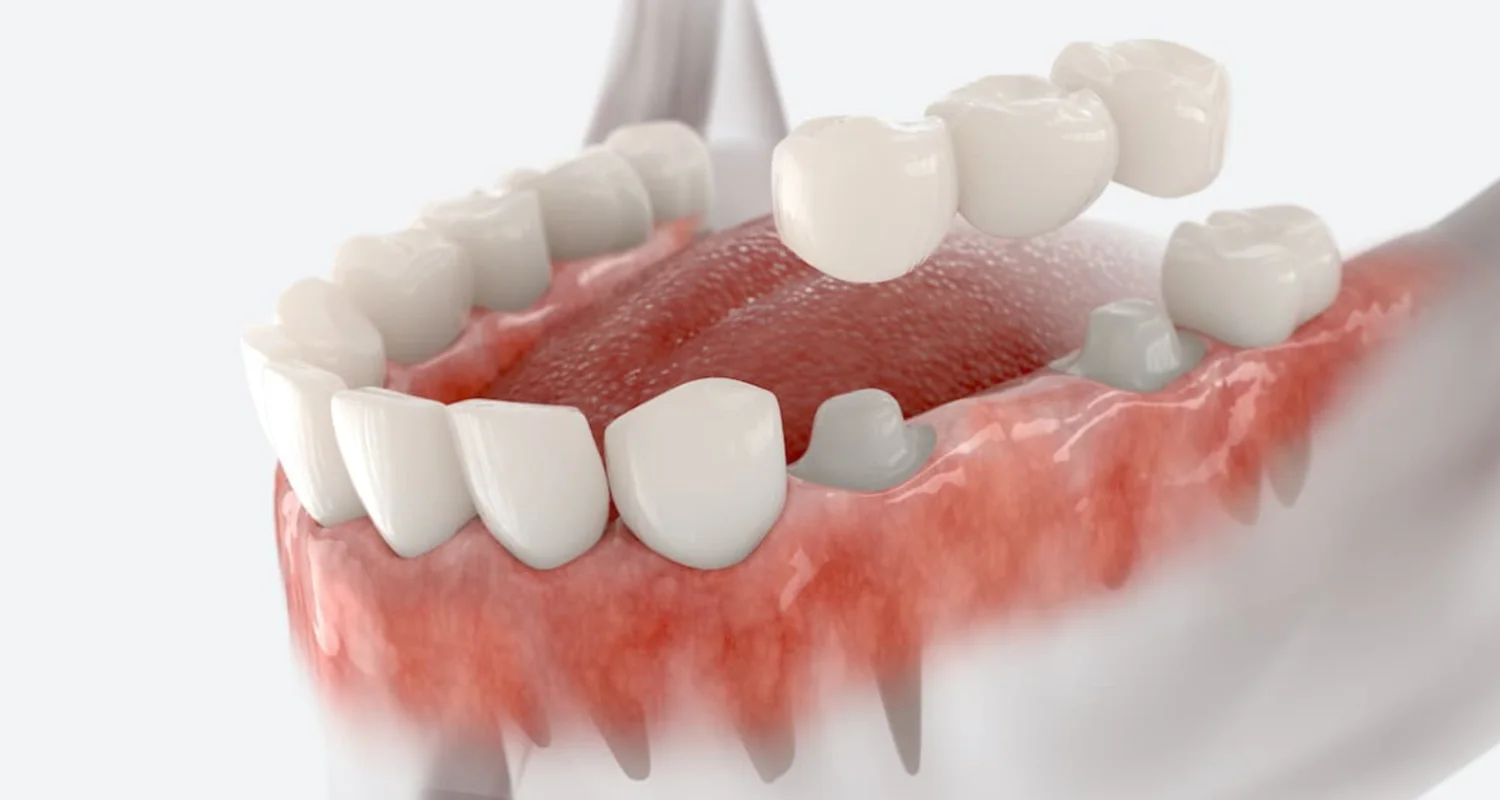
4. Dental bonding glue (for tooth repairs and fillings)
This adhesive is used by dentists for repairing cavities, bonding veneers, or fixing chipped teeth with composite resin.
How it works: The glue penetrates the tooth’s enamel and dentin, creating a secure connection. A special light activates the adhesive, hardening it to form a strong and lasting bond — similar to the way a high-tech glue gun works for teeth!
5. Denture repair glue
Also known as acrylic or methyl methacrylate, this material is used to fix broken dentures.
How it works: A powder and liquid mix creates a chemical reaction that forms a hard, durable material. However, improper use can damage dentures; it’s best to let a dentist handle any repairs instead of attempting a DIY fix.
When should teeth glue be used?
Teeth glue can be useful in certain situations, but knowing when and how to use it safely is important.
● Temporary repairs: Teeth glue can serve as a short-term solution for minor dental issues, such as:
-Securing a loose crown until you see a dentist.
-Holding a broken denture together temporarily.
-Covering minor chips or cracks to prevent further damage.
However, these are not permanent solutions, and professional treatment should always follow.
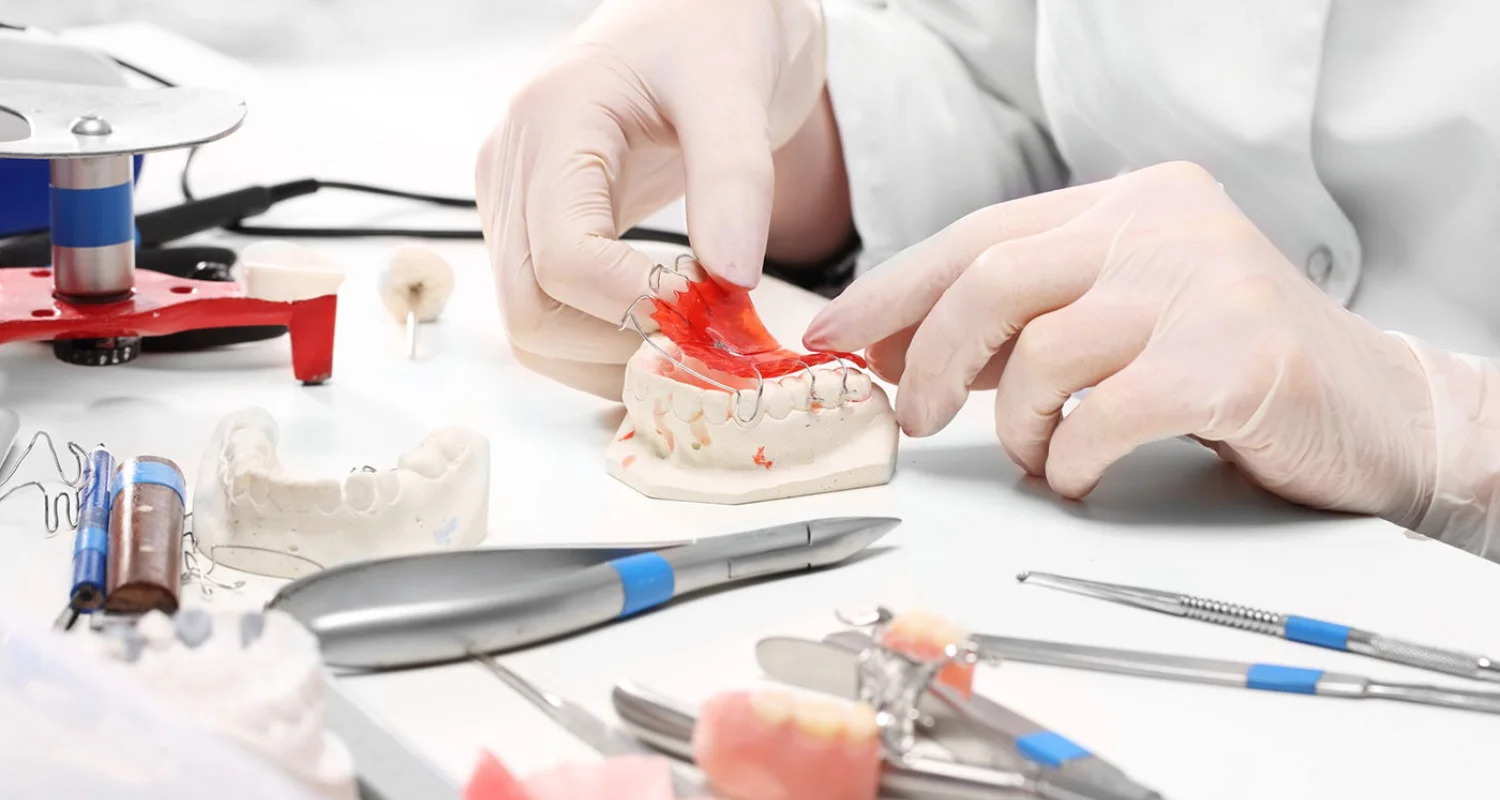
● Emergency situations: In cases where immediate dental care isn’t available, temporary teeth glue can help prevent further complications. Examples include:
-A crown falls off while traveling or outside clinic hours.
-A denture breaks before an important event or meeting.
-A minor tooth chip causes discomfort and needs protection.
In these situations, a temporary adhesive can provide short-term relief until a dentist can properly fix the issue.
● Professional applications: For permanent dental solutions, only a dentist should apply professional-grade adhesives, such as:
–Crowns and bridges: Secured with strong dental cement.
-Orthodontic devices: Braces and retainers require specialized adhesives.
-Fillings and tooth repairs: Bonding agents attach resin or ceramic restorations to natural teeth.
Using the right type of teeth glue in the correct situation helps maintain oral health, but professional care is always recommended for long-lasting results.
Finding the right teeth glue for your needs
Choosing the correct teeth glue is essential for maintaining oral health and preventing complications. While some adhesives are designed for professional use, others are available over the counter for temporary fixes. However, using the wrong type—especially household adhesives like super glue—can lead to severe damage and health risks.
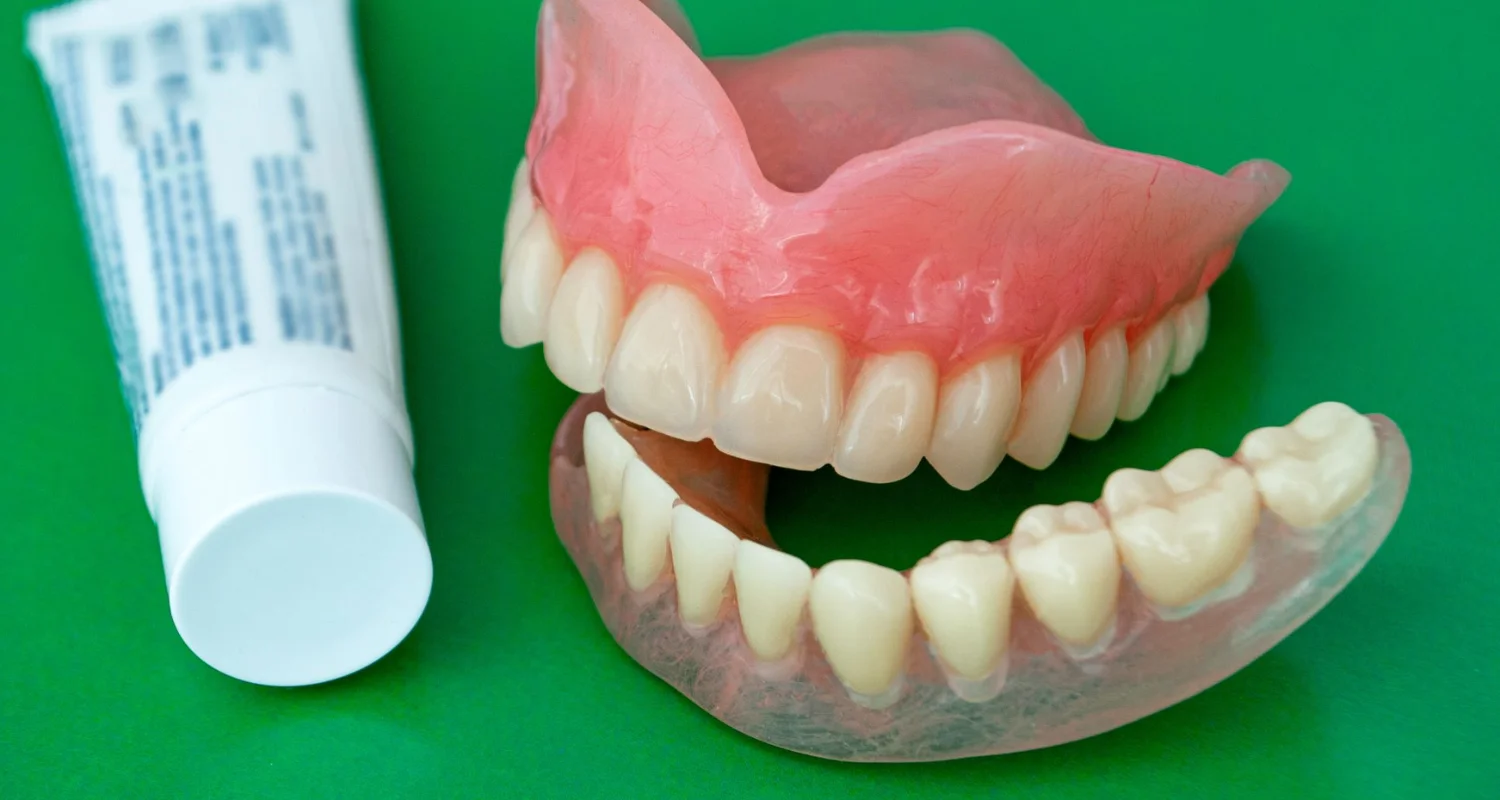
Professional dental adhesives
These high-quality adhesives are used by dentists for permanent dental treatments, such as:
● Crowns and bridges: Secures restorations for long-term stability.
● Veneers: Attaches thin porcelain shells to the front of teeth.
● Fillings and restorations: Bonds composite materials to natural teeth.
Why use them? They are:
● Medically approved and safe for oral use.
● Long-lasting and moisture-resistant.
● Designed for secure bonding without damaging teeth.
These adhesives provide strong, durable bonds and should always be applied by a professional to ensure proper placement and safety.
Over-the-counter teeth glue
Available at pharmacies, these adhesives are meant for temporary emergency fixes, such as:
● Securing a loose crown until a dentist can repair it.
● Holding a broken denture together for short-term stability.
● Covering minor chips or cracks to prevent discomfort.
Limitations:
● Not as strong as professional adhesives.
● Should never be used as a permanent solution.
● Improper use can lead to further complications.
DIY or non-dental glues (not recommended)
While teeth glue can be helpful for securing dentures or fixing temporary crowns, using the wrong type, especially household adhesives like super glue, can lead to serious dental and health problems. Unlike professional dental adhesives, which are made to be safe for oral use, household glues contain toxic chemicals that can cause severe reactions and long-term damage.
Risks of using household glue:
● Toxicity: Household glues contain harmful chemicals that are not safe for oral use.
● Damage to teeth and gums: Industrial adhesives can bond too strongly, making removal difficult and increasing the risk of tooth fractures or gum irritation.
● Infections: Non-dental glue can trap bacteria, leading to serious infections that may require emergency treatment.
● Limited durability: Household adhesives are not designed for use in the mouth and may fail unexpectedly, leading to loose restorations and discomfort.
● Allergic reactions: The chemicals in household glues can cause swelling, itching, irritation, and even breathing difficulties.
● Poisoning and digestive issues: If swallowed, these adhesives can irritate the stomach and cause nausea, diarrhea, or even require hospital treatment.
● Higher treatment costs: Incorrect use of non-dental glue may force a dentist to break or completely replace a restoration, leading to additional expensive procedures.
If you need to fix a dental issue, always use glue designed for oral use and follow the instructions carefully. For anything more than a temporary fix, see a dentist as soon as possible. The wrong glue can do more harm than good, leading to pain, infection, and costly dental repairs.
Here you can make an appoiment and have a online consultation.
Step-by-step guide to using teeth glue
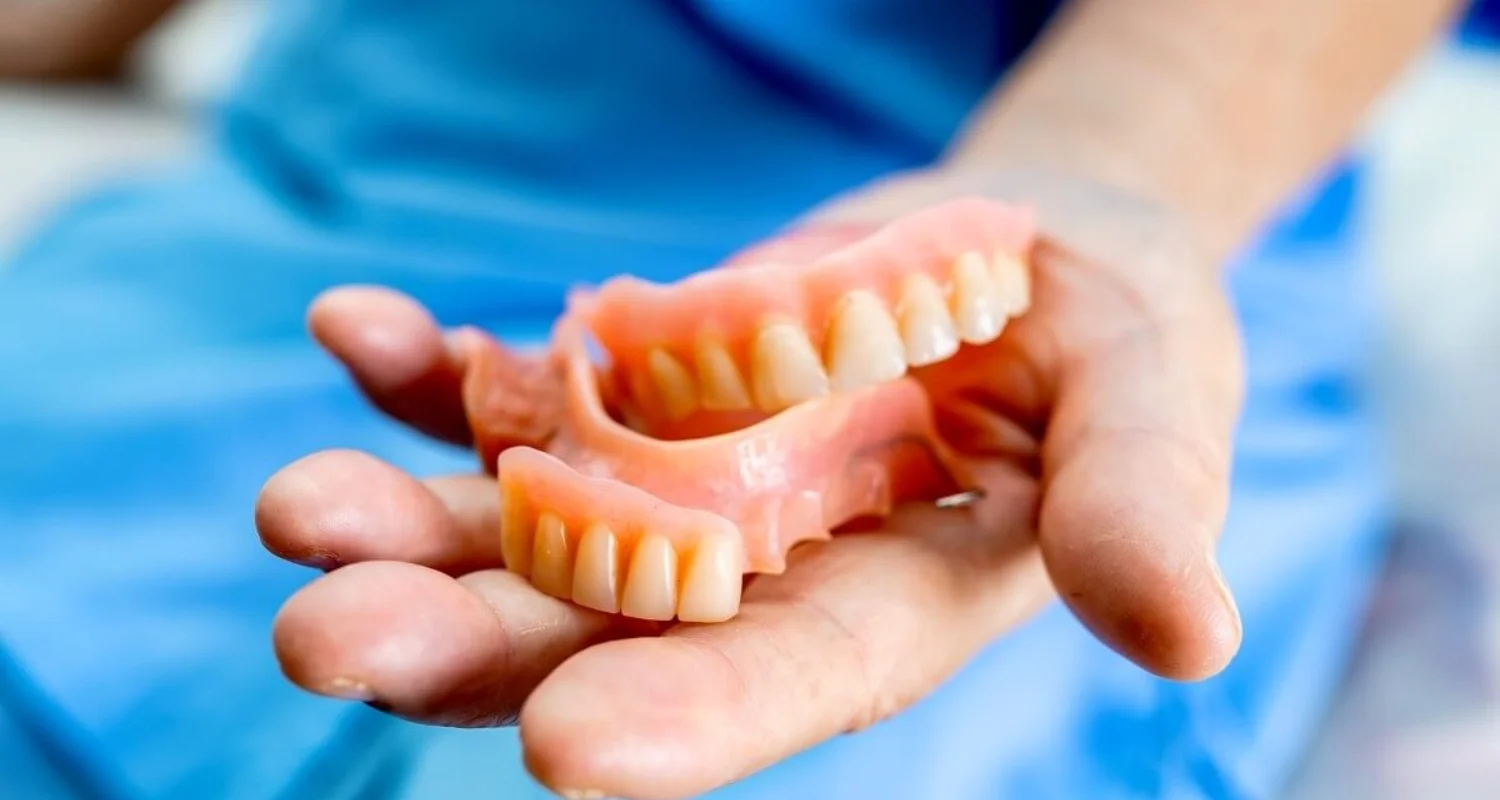
Teeth glue can be a temporary solution when dealing with a loose crown, shifting dentures, or a fallen veneer. It helps prevent discomfort, protects your teeth from further damage, and can save you from an embarrassing situation. However, it’s essential to use the right type and follow proper steps to avoid complications.
Below is a safe and effective way to apply over-the-counter teeth glue when needed:
1. Clean the area: Rinse the affected tooth, crown, veneer or denture thoroughly with warm water. Use an antibacterial soap and a toothbrush to remove old adhesive, food debris, and bacteria.
Clean the exposed tooth, tongue, and gums to maintain good oral hygiene and prevent infection. In this link you can find the best products to improve your dental routine.
2. Dry the surface: Moisture weakens adhesion, so be sure that everything is completely dry before applying the glue.
-For dentures: Dry both the denture and the gums before applying adhesive.
-For crowns or veneers: Use cotton or gauze to dry the tooth and restoration.
3. Prepare the glue: If using temporary dental glue, follow your dentist’s recommendations. Most adhesives come as two pastes (a base and a catalyst) that need to be mixed evenly before application.
4. Apply the glue: Use only a small amount, excess glue can cause spillage, irritation, or make removal difficult.
-For dentures: Apply small dots of adhesive as directed by the product instructions.
-For crowns or veneers: Apply a thin, even layer inside the restoration.
5. Position the tooth/prosthetic: Place the dental piece carefully back in position and press firmly for a few seconds to ensure it sticks properly.
6. Let it set: Follow the product instructions for the recommended setting time. During this period, avoid eating or drinking to allow the glue to bond securely.
7. See your dentist as soon as possible: this fix won’t last forever. Temporary glue dissolves over time, and a professional will provide a permanent solution.
Using teeth glue correctly can help in an emergency, but it should never replace professional care. Always schedule a dental appointment for long-term treatment.
Recommendations for using teeth glue safely
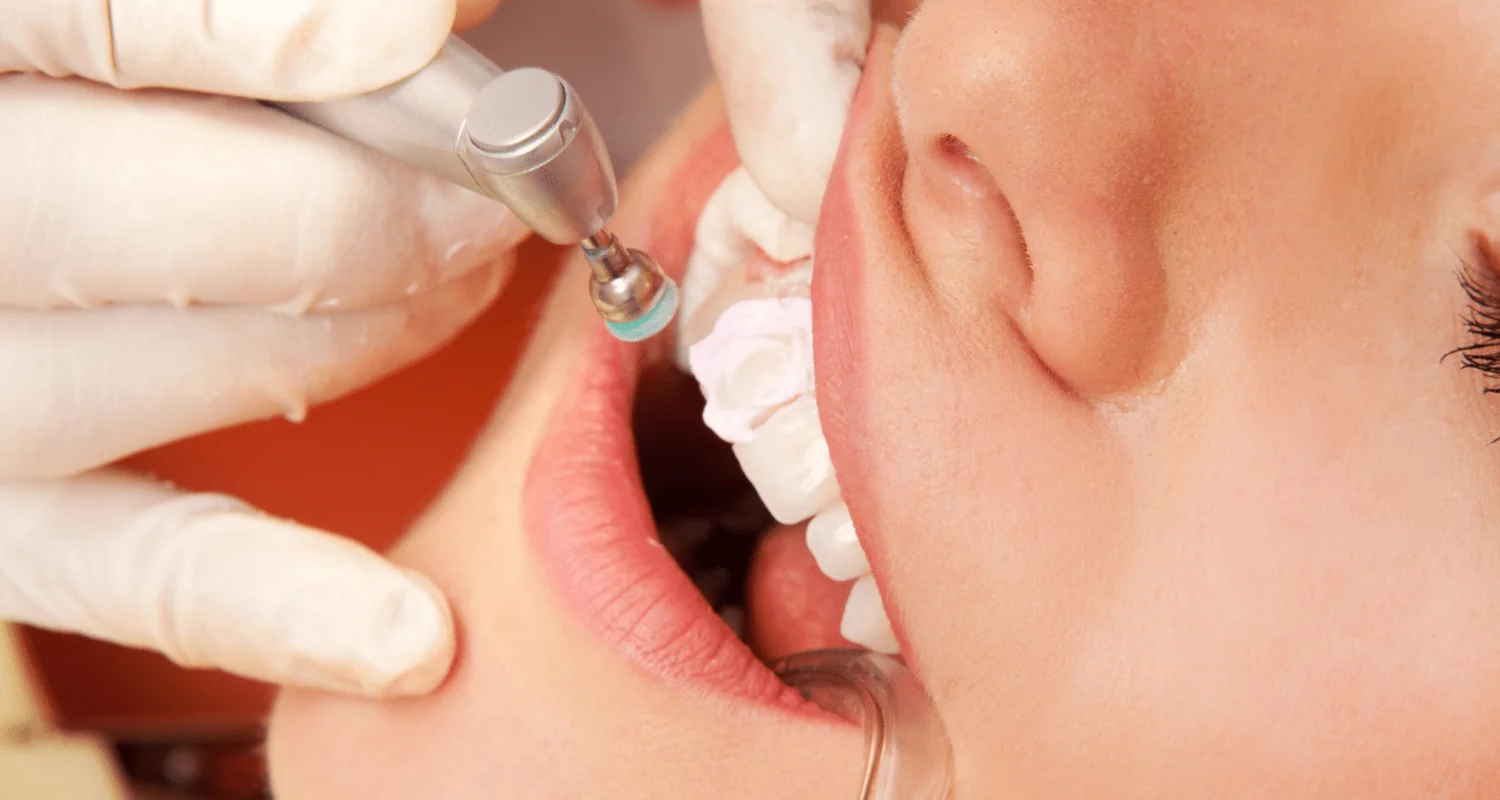
To ensure the safe and effective use of teeth glue, follow these important guidelines:
● Teeth glue is a temporary solution: It should only be used as a short-term fix until you can see a dentist. Temporary crowns and other restorations require urgent professional attention.
● Never use household or industrial glues: Products like superglue (cyanoacrylates) contain toxic and irritating chemicals that are unsafe for oral use and can damage your teeth and gums.
● Follow the correct amount and frequency: Overusing or misusing dental adhesives can lead to allergic reactions, infections, or fractures in teeth and dentures. Always follow your dentist’s instructions and the product’s guidelines.
● Do not attach crowns or posts to teeth with exposed roots or open canals: This can trap bacteria, leading to serious infections or abscesses. If you experience this issue, see a dentist immediately.
● Use teeth glue only as a short-term fix: It’s not designed for long-term use. Even over-the-counter dental adhesives should only be used until professional treatment is available.
● Prioritize good oral hygiene: Keeping your teeth and gums clean helps prevent infections and reduces complications while using temporary adhesives. Brush yout teeth and rinse regularly to maintain oral health.
Teeth glue can be a helpful temporary fix for loose dentures, broken prosthetics, or detached crowns in emergencies. However, it’s important to use it correctly and under a dentist’s guidance to avoid complications. While over-the-counter adhesives can provide short-term relief, misusing them or using industrial glues, like superglue, can seriously harm your teeth and gums, leading to infections, allergic reactions, or even permanent damage.
To use it safely, always follow professional advice and maintain good oral hygiene. Remember, teeth glue is not a long-term solution, it’s just a temporary fix until you can see a dentist. Staying in touch with your dentist and following their recommendations will help protect your oral health and prevent bigger problems in the future.
Frequently Asked Questions
Can I use superglue to fix a broken tooth or crown?
No! Superglue (cyanoacrylate) is toxic, not designed for oral use, and can damage your teeth and gums. It can also trap bacteria, leading to infections. If a crown or veneer falls off, use temporary dental glue from a pharmacy and see a dentist as soon as possible.
What should I do if my crown falls off at night or on the weekend?
If you can’t see a dentist right away, you can:
-Clean the crown and tooth with warm water.
-Dry the area and apply temporary dental glue from a pharmacy.
-Avoid chewing on that side until you get professional care.
-Never use household glue to reattach a crown
Can I use teeth glue to fix a broken retainer?
No, do not use dental glue for retainers. Retainers need to fit precisely, and using glue can alter their shape, making them ineffective or even harmful. Instead, visit your orthodontist for a professional repair.
Can I fix a cracked tooth with teeth glue?
No, dental glue is not meant for fixing cracked or broken teeth. If you have a cracked tooth, avoid chewing on it, and see a dentist immediately to prevent further damage or infection.
Why can teeth glue cause facial swelling?
Facial swelling after using teeth glue can occur if bacteria or debris get trapped in the gums, under a poorly fitted denture, or inside a tooth’s root canal, leading to a serious infection like a dental abscess. Some adhesives may also irritate oral tissues, causing inflammation and discomfort. If you experience swelling, seek dental care immediately; it could indicate an infection that requires urgent treatment.
Share
References
1. Cleveland Clinic collaborators. (2024, 25 July). Dental bonding. Cleveland Clinic. https://my.clevelandclinic.org/health/treatments/10922-dental-bonding
2. Denture adhesives guidelines. (s. f.). Oral Health Foundation. https://www.dentalhealth.org/dentureadhesives
3. Erdemir, A., Eldeniz, A. U., & Belli, S. (2007). Effect of temporary filling materials on repair bond strengths of composite resins. Journal Of Biomedical Materials Research Part B Applied Biomaterials, 86B(2), 303-309.
4. Felton, D., Cooper, L., Duqum, I., Minsley, G., Guckes, A., Haug, S., Meredith, P., Solie, C., Avery, D., & Chandler, N. D. (2011). Evidence-based guidelines for the care and maintenance of complete dentures. The Journal Of The American Dental Association, 142, 1S-20S. https://doi.org/10.14219/jada.archive.2011.0067
5. Sofan, E., Sofan, A., Palaia, G., Tenore, G., Romeo, U., & Migliau, G. (2017). Classification review of dental adhesive systems: from the IV generation to the universal type. Annali Di Stomatologia, 8(1), 1. https://doi.org/10.11138/ads/2017.8.1.001
6. Veitz, K. A., Spivakovsky, S., Lo, D., Furnari, W., & ElSayed, H. (2019). Adhesive restorations for the treatment of dental non-carious cervical lesions. Cochrane Library. https://www.cochranelibrary.com/cdsr/doi/10.1002/14651858.CD011449.pub2/full
- DDS Juliana Garzon [Author]
Dr. Juliana Garzón Ariza Endodontics Specialist | Passionate Advocate for Oral Health Transformation Graduating from the esteemed Universidad Nacional de Colombia in 2021, I am a dentist and a final-year resident specializing in Endodontics. My professional mission is to transform oral health through prevention, highly specialized treatments, and patient education. With a strong focus on dental research, I am driven to innovate solutions in critical areas such as dental pain, infections, dent...
View all posts
- Dr. Yeidy Carolina Mesa [Medical Reviewer]
DDS Yeidy Carolina Mesa Passionate Dentist | Advocate for Accessible Oral Health Education Graduating from Universidad CES in 2022, I am a dedicated general dentist with a lifelong passion for helping others and making a meaningful impact in the world. My journey into dentistry began at the age of 7, inspired by my own experience with braces and overcoming a fear of the dentist. This personal journey shaped my mission to help patients conquer their own dental anxieties and embrace a healthier,...
View all posts


